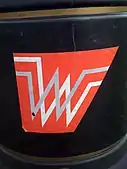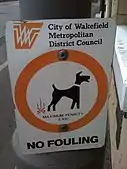Wakefield Council | |
|---|---|
| Third of council elected three years out of four | |
 | |
Council logo | |
| Type | |
| Type | |
| Leadership | |
Andrew Balchin since 2020[3] | |
| Structure | |
| Seats | 63 councillors |
Political groups |
|
Joint committees | West Yorkshire Combined Authority |
| Elections | |
| Multiple member first-past-the-post voting | |
Last election | 4 May 2023 |
Next election | 2024 |
| Motto | |
| Persevere and prosper | |
| Meeting place | |
%252C_Wood_Street%252C_Wakefield.jpg.webp) | |
| County Hall, Bond Street, Wakefield, WF1 2QW | |
| Website | |
| www | |
Wakefield Council, formally the City of Wakefield Metropolitan District Council, is the local authority of the City of Wakefield in West Yorkshire, England. Wakefield is a metropolitan borough with city status. The council and provides a full range of local government services including Council Tax billing, libraries, social services, town planning, waste collection and disposal, and it is a local education authority. Wakefield is divided into 21 wards, electing 63 councillors. A third of the council is elected for three of every four years.
The council was created in 1974 under the Local Government Act 1972 and replaced the Wakefield City Council of the County Borough of Wakefield and several other authorities.
As of May 2019 the council is controlled by the Labour Party. The council leader has been Denise Jeffery since December 2019 and Andrew Balchin is the chief executive. Wakefield Council has been a constituent member of the West Yorkshire Combined Authority since 2014.
History
The metropolitan district of Wakefield was created on 1 April 1974 under the Local Government Act 1972. It covered the whole area of eleven former districts and parts of another two, which were all abolished at the same time:[4][5]
- Castleford Municipal Borough
- Featherstone Urban District
- Hemsworth Rural District (part)
- Hemsworth Urban District
- Horbury Urban District
- Knottingley Urban District
- Normanton Urban District
- Osgoldcross Rural District (parishes of Darrington and East Hardwick only)
- Ossett Municipal Borough
- Pontefract Municipal Borough
- Stanley Urban District
- Wakefield County Borough
- Wakefield Rural District
The county borough of Wakefield had provided all local government services in its area. The other districts had been lower-tier authorities with West Riding County Council providing county-level services. The new Wakefield district was awarded borough status from its creation, allowing the chair of the council to take the title of mayor.[6] The old county borough of Wakefield's city status was extended to cover the whole of the new borough.[7]
Wakefield was initially a district-level authority, with West Yorkshire County Council providing county-level services. However, the metropolitan county councils, including West Yorkshire County Council, were abolished in 1986 under the Local Government Act 1985. Since 1986 Wakefield Council has therefore been responsible for most local government functions.[8]
In 2004 the district's council housing was transferred to Wakefield and District Housing (WDH), a new independent housing association. Council houses account for around 30% of the district's housing.
The council has been a constituent member of the West Yorkshire Combined Authority since 2014, which has been led by the directly elected Mayor of West Yorkshire since 2021.[9]
Governance

The local authority derives its powers and functions from the Local Government Act 1972 and subsequent legislation. For the purposes of local government, Wakefield is within a metropolitan area of England. As a metropolitan district council, Wakefield Metropolitan District Council provides most local government functions directly, including collecting Council Tax and business rates, town planning, housing, waste collection and environmental health, social services, libraries and waste disposal. It is also a local education authority. Wakefield Council is the billing authority for Council Tax, and collects precepts on behalf of the West Yorkshire Police and Crime Commissioner and the West Yorkshire Fire and Civil Defence Authority.
Certain services are provided with the other local authorities in West Yorkshire. The council is represented on West Yorkshire Joint Services Committee (for trading standards, archives, archaeology and grants), West Yorkshire Fire and Civil Defence Authority, West Yorkshire Integrated Transport Authority and the West Yorkshire Police and Crime Panel.[10] Wakefield Council has been a constituent member of the West Yorkshire Combined Authority since 2014.
Political control
The first election to the reconstituted council was held in 1973, initially operating as a shadow authority alongside the outgoing authorities until the new arrangements came into effect on 1 April 1974. Labour has held a majority of the seats on the council since its creation:[11][12]
| Party in control | Years | |
|---|---|---|
| Labour | 1974–present | |
Leadership
The role of mayor is largely ceremonial in Wakefield. Political leadership is instead provided by the leader of the council. The leaders since 1998 have been:[13]
| Councillor | Party | From | To | |
|---|---|---|---|---|
| Peter Box | Labour | 1998 | 30 Nov 2019 | |
| Denise Jeffery | Labour | 1 Dec 2019 | ||
Composition
Following the 2023 election, the composition of the council was:[14]
| Party | Councillors | |
|---|---|---|
| Labour | 49 | |
| Conservative | 7 | |
| Liberal Democrats | 3 | |
| Independent | 4 | |
| Total | 51 | |
Two of the independent councillors sit together as the "Wakefield Independent Group", the other two do not belong to a group.[15] The next election is due in 2024.
Premises
.jpg.webp)
The council meets at County Hall on Bond Street in Wakefield. The building was completed in 1898 as the headquarters of the former West Riding County Council, and subsequently served as the headquarters of West Yorkshire County Council between 1974 and 1986. Following the abolition of West Yorkshire County Council in 1986 the building was acquired by Wakefield Council. County Hall is a Grade I listed building.[16]
The council has its main offices and customer services centre in the nearby Wakefield One building on Burton Street, which was completed in 2012 and also houses the city's main library.[17][18]
Elections
Since the last boundary changes in 2004 the council has comprised 63 councillors representing 21 wards, with each ward electing three councillors. Elections are held in three out of every four years, with a third of the council (one councillor for each ward) elected at a time for a four-year term.[19]
|
|
|
Former logos
 A rubbish bin in Wakefield city centre showing the former logo of the council.
A rubbish bin in Wakefield city centre showing the former logo of the council. A sign in South Wakefield depicting the former council logo with the full official title.
A sign in South Wakefield depicting the former council logo with the full official title. This sign found attached on Wakefield Town Hall shows the former logo and full title
This sign found attached on Wakefield Town Hall shows the former logo and full title
References
- ↑ Gardner, Tony (18 May 2023). "Councillor Josie Pritchard sworn in as Wakefield district's new mayor". Wakefield Express. Retrieved 20 June 2023.
- ↑ "Council minutes, 16 October 2019" (PDF). Wakefield Council. Retrieved 20 June 2023.
- ↑ "Wakefield Council confirms Andrew Balchin as new chief executive". Wakefield Express. 17 December 2020. Retrieved 28 January 2021.
- ↑ "Local Government Act 1972", legislation.gov.uk, The National Archives, 1972 c. 70, retrieved 18 June 2023
- ↑ "The Metropolitan Districts (Names) Order 1973", legislation.gov.uk, The National Archives, SI 1973/137, retrieved 18 June 2023
- ↑ "District Councils and Boroughs". Parliamentary Debates (Hansard). 28 March 1974. Retrieved 16 January 2012.
- ↑ "No. 46303". The London Gazette. 31 May 1974. p. 6486.
- ↑ "Local Government Act 1985", legislation.gov.uk, The National Archives, 1985 c. 51, retrieved 18 June 2023
- ↑ "The West Yorkshire Combined Authority Order 2014". www.legislation.gov.uk.
- ↑ "Constitution" (PDF).
- ↑ "Compositions calculator". The Elections Centre. Retrieved 10 August 2022.
- ↑ "Wakefield". BBC News Online. 19 April 2008. Retrieved 3 December 2009.
- ↑ "Council minutes". Wakefield Council. Retrieved 12 August 2022.
- ↑ "Local elections 2023: full council results for England". The Guardian. 9 May 2023. Retrieved 18 June 2023.
- ↑ "Your councillors by party". Wakefield Council. Retrieved 20 June 2023.
- ↑ Historic England. "County Hall (offices of West Yorkshire County Council), Bond Street, Wakefield (1242349)". National Heritage List for England. Retrieved 13 August 2019.
- ↑ "Contact us". Wakefield Council. Retrieved 20 June 2023.
- ↑ Spereall, David (15 October 2019). "Wakefield One council office could become 'smart' building with new sensors". Wakefield Express. Retrieved 20 June 2023.
- ↑ "The City of Wakefield (Electoral Changes) Order 2003", legislation.gov.uk, The National Archives, SI 2003/3087, retrieved 20 June 2023
